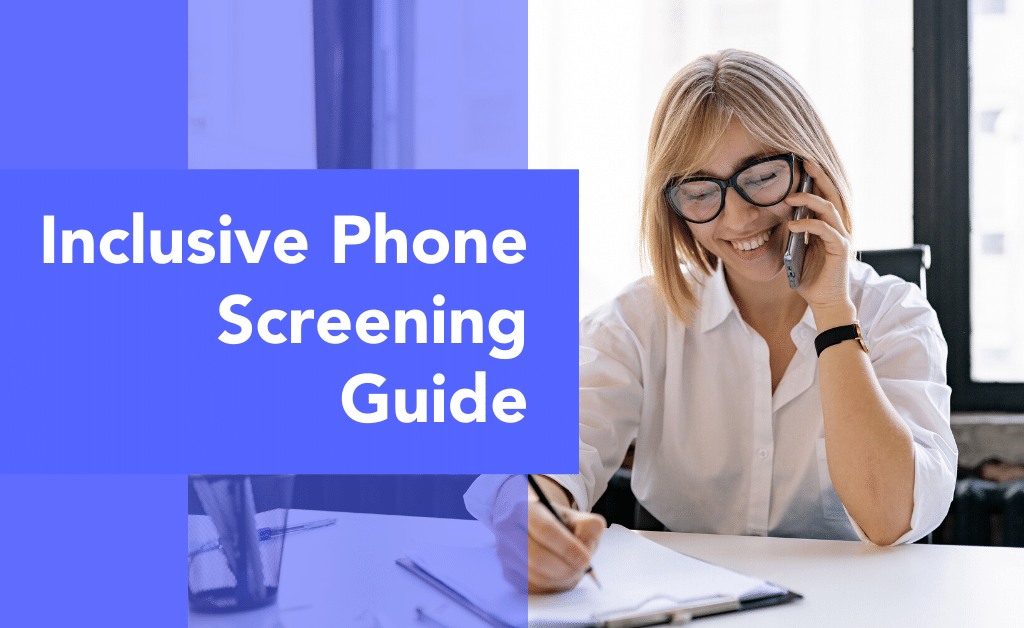Phone screens are an integral part of any company’s hiring process and can help identify good candidates for the job. However, this interview step is not immune to bias. Anything from an accent to the sound of children in the background can consciously or unconsciously influence your opinion of a candidate.
Luckily, there are steps that recruiters and hiring managers can take to make the phone screening process an inclusive experience.

Download the complete JobSage guide!
Learn how you can avoid bias in your phone screen process.
What is a phone screen?
A phone screen is typically the first step in a company’s hiring process. If you read an applicant’s resume and like what you see, your next move is a phone screen.
This short phone call— usually between 15 and 30 minutes long— is a chance for you to get to know the candidate a little better, learn more about their experience, and get some insight as to whether or not they would be a good fit for the role that they applied for.
If the candidate feels like a good fit for the role, you can proceed with scheduling longer, formal interviews. If not, you can politely let them know and move on to other candidates.
Why do phone screens matter?
Job descriptions and resumes can only say so much. If a recruiter set up a full-length interview with everyone who sent an application, there’d be no time left for anything else! A brief phone call shares valuable information that can save everyone time in the interview process if the candidate is not a good fit.
As a recruiter, you’ll be able to dive a little deeper into their resume and better understand their experience and qualifications. You’ll also be able to ask questions that will help you determine whether they would be a fit for your company’s values and add to the overall workplace culture.
It’s also a good time for a candidate to ask any questions that they may have about the company that isn’t obvious by looking at your company’s website or profile. It’s possible that a candidate may determine that an employer isn’t a good fit for them just by what they learn during the phone screen.
Additionally, it is not outside the realm of possibility that the candidate is applying and interviewing for other companies. This initial phone screen is an opportunity to set your company and employee experience apart from the competition.
Bias in phone screens
Unfortunately, biases can creep into all parts of the interview process, including the phone screen. Oftentimes, these biases are unconscious, meaning you may not even realize that your mind is drawing conclusions about the candidate based on seemingly small details.
For example:
- Someone’s voice or area code can suggest and lead to biases around their ethnicity or socioeconomic background.
- Hearing children in the background of the call could lead to a motherhood penalty for women.
- If it’s a video interview, physical appearance can lead to bias— either an unfairly positive bias if they look like people who already work at the company or unfairly negative bias if they don’t.
If you aren’t careful, these biases can lead you to dismiss a candidate who may actually thrive at your company.
The solution: Structured phone screens
So how can you combat bias in phone screens, along with every other step of the interview process?
The answer: structured interviewing.
We’ve talked about structured interviews before, but if you’re new to this rodeo, let’s break it down.
In short, the structured interview process is a standardized approach that is focused on assessing all candidates using predetermined questions. Every candidate is asked the same questions, in the same order. This helps you base your hiring decisions on facts— not implicit biases.
Aside from being more inclusive, structured phone screens:
- Help you avoid asking any illegal questions
- Give you actionable insights that lead to better hiring decisions
- Are part of an overall hiring process that leads to greater diversity
- Leave candidates feeling good about your company and their interview, even if you decide to not move forward with them
Though inclusive phone screens take some time to coordinate and prepare, they can actually streamline your hiring process and ensure fairness and consistency. For more details about what to say during the phone screen, be sure to download our PDF resource. In it, you’ll find questions to ask, along with the reasoning behind those questions. Remember, you can add or drop questions to the script that you use— but, it’s important to put thought and care into the questions that you ask. For more interview question inspiration, visit 100+ Interview Questions for Recruiters to Use.

Download the guide and keep it handy!
Use the guide whenever you conduct phone interviews to ensure inclusivity.
